Beekeeping is part art, part science and for Crissy Ward it is also a labor of love and a fulfillment of her God-given purpose.
Introduced to beekeeping through a friend around 2019, Crissy said when she saw “what and how bees create,” she knew God was guiding her down a very specific path.
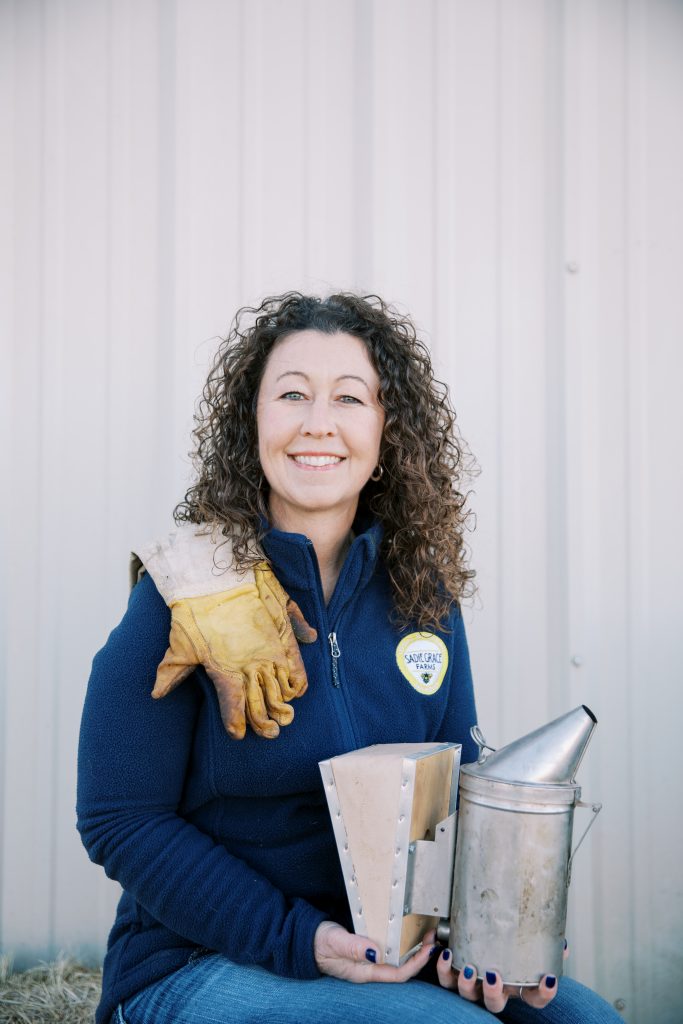 Like a Bee to Honey
Like a Bee to Honey
“My spiritual life is a big part of all of this,” she said, “and when my friend, who is an established beekeeper, first opened the bee (hive) box, I fell in love and was in awe of the world they create.”
Crissy said after visiting their apiary, she dove in with both feet – learning, researching and even removing and keeping her first hive soon after.
A graduate of Hardin-Simmons University, Crissy said she has always had an affinity for the outdoors – “my mom would have to drag me back in,” she joked – and as a result, her love of animals and insects was a big part of her upbringing.
 It was this love and reverence for all God’s creatures, as well as the influence of her homebuilder father, that played a big part in Crissy’s fascination with bees. Sadie Grace Farms where I learned a lot about building construction,” said Crissy, who likened the bee’s hives to something as complex as any brick-and-mortar structure, with members of the hive having very defined and specific tasks.
It was this love and reverence for all God’s creatures, as well as the influence of her homebuilder father, that played a big part in Crissy’s fascination with bees. Sadie Grace Farms where I learned a lot about building construction,” said Crissy, who likened the bee’s hives to something as complex as any brick-and-mortar structure, with members of the hive having very defined and specific tasks.
Describing bees as “little architects,” Crissy said it is both fascinating and wonderous to watch them build their structures out of wax.
The Impact of Bees
Crissy said as pollinators, bees play a crucial role in the ecosystem, especially considering there are things that only bees pollinate.
In fact, according to data from the United States Department of Agriculture, bees are responsible for pollinating $30 billion worth of crops per year and seventy percent of the hundred-most consumed food crops by humans.
“When you realize that one out of every three bites of food we take has been pollinated by bees, it’s clear how necessary they are,” said Crissy, who added that their far reaching impact is apparent in the fact that things like cotton, flowers and trees couldn’t be pollinated without them.
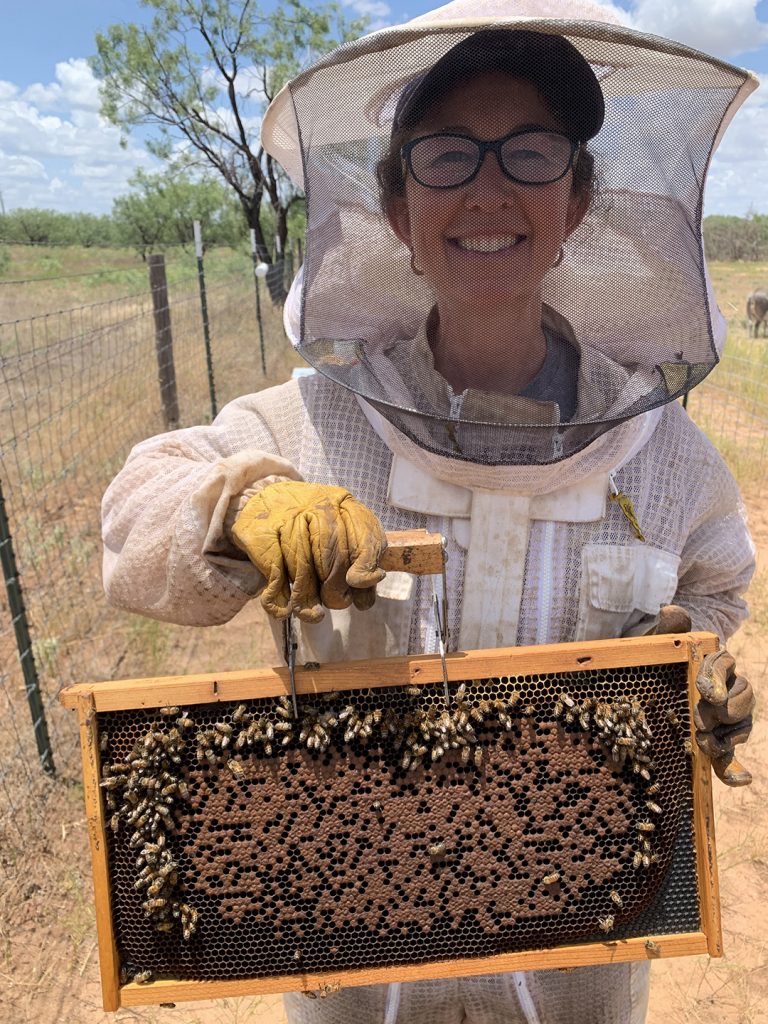 “It’s not just humans that benefit,” she said. “Every walk of life is eating what they pollinate.”
“It’s not just humans that benefit,” she said. “Every walk of life is eating what they pollinate.”
Crissy established her apiary – where her honeybees and hives are kept – in 2022, and while on the phone registering with the Texas Apiary Inspection Services, was told that they needed a name.
“I was talking to them and looking outside at the same time, when I saw my border collie, Sadie Grace, making her rounds in the yard. I began thinking about how loyal Sadie is and how she is the protector of the farm. I thought about, just like Sadie, bees are very loyal and how important they are, just as she is to the workings of the farm,” Crissy said. “The name hit me then and stuck – it was perfect.”
Crissy said it is fitting that Sadie was rescued, as were just about every other living thing on the farm.
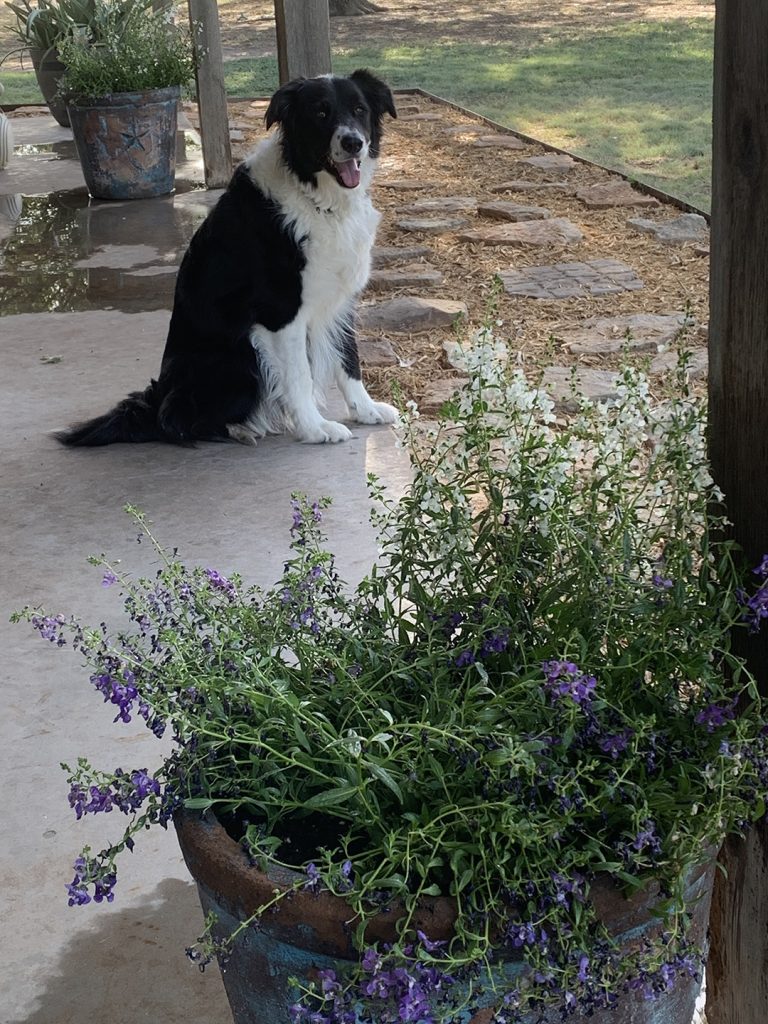 As she says on her website, “Our farm has been built mainly through rescues, and there being a need for a loving home. Our first hive was a removal, some of our chickens were removed from a neglectful situation, and sweet Sadie Grace was homeless after the loss of her owner. God knew what was needed and put me in a situation to listen to His calling.”
As she says on her website, “Our farm has been built mainly through rescues, and there being a need for a loving home. Our first hive was a removal, some of our chickens were removed from a neglectful situation, and sweet Sadie Grace was homeless after the loss of her owner. God knew what was needed and put me in a situation to listen to His calling.”
Don’t Poke the Bee’s Nest
Crissy says a large part of the work at Sadie Grace Farms involves removal and relocation, which involves a trained team whose job it is to get the entirety of the hive out of its current location and transferred to another site.
She said there are different types of removals varying in complexity and it is her and her team’s job to assess the situation and determine the best course to take. “Many times, bees will get established in a building structure, like in the eaves of a house, in a shed or in trees, and as a builder’s daughter, I recognize the importance of removal, because it helps both the bees and the homeowners,” she said, stressing the importance of relocating the bees rather than killing them.
“By choosing to have the bees professionally removed instead of spraying them, you are helping the agriculture in your area,” she said, adding that “our phone rings all year long, but most of the calls for removals come between late February to fall.”
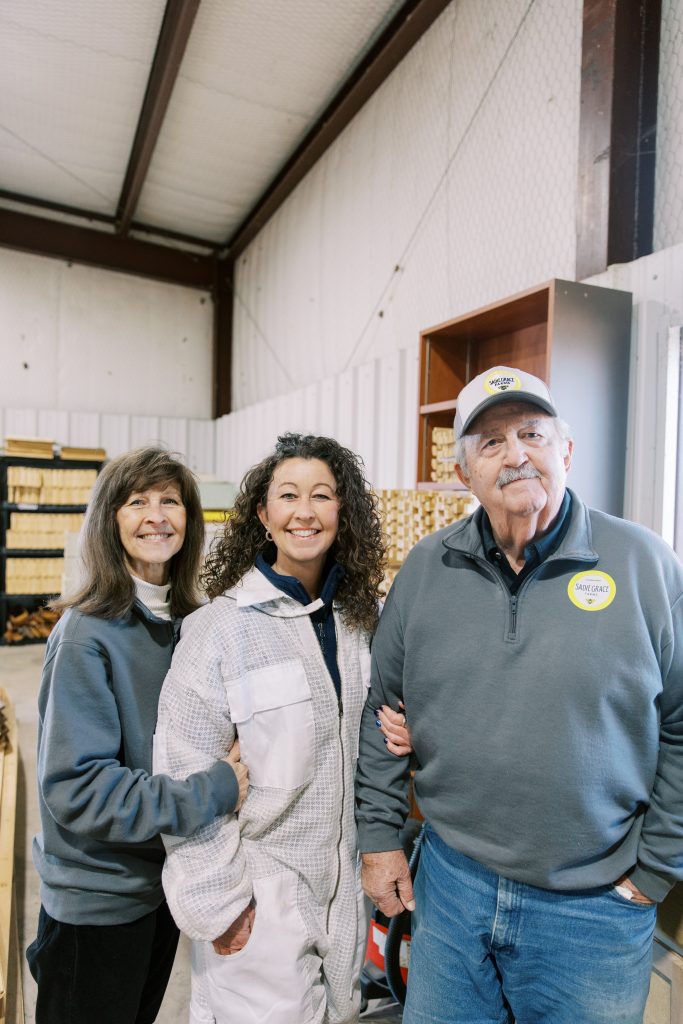 Saying that she and her team “want what is best for the bees,” those involved with removal adhere to what she says are “ethical and safe procedures” throughout the process and added that many hives she has removed are brought to her apiary and used to help people get started in beekeeping.
Saying that she and her team “want what is best for the bees,” those involved with removal adhere to what she says are “ethical and safe procedures” throughout the process and added that many hives she has removed are brought to her apiary and used to help people get started in beekeeping.
Named president of the Big Country Beekeepers Association, an organization that spans 16 counties, Crissy uses her leadership skills to educate the public on the importance of bees, as well as dispel any fears and myths surrounding these amazing insects.
“My heart is in education, and I really love speaking to groups,” said Crissy, who offered this interesting “gee whiz” fact.
“One of the many remarkable things about bees is that their honey is the only food source on the planet you can eat and survive on it alone – you don’t have to eat anything else if you’re eating honey. And it never goes bad,” she said.
But as with all living things, Crissy said respect and a healthy dose of caution must be observed when approaching a hive.
“It’s a myth that bees are aggressive,” she said. “They’re actually defensive and will defend their colony – their family – just like we would defend our family. Because of this, we need to understand who they are and what they’re doing. Just like us, a lot of things can upset them, especially when they’re hot and hungry during the summers.”
“As I tell the groups of kids I talk to, ‘if someone opens your front door without knocking, what would your dad do? It’s the same thing if someone gets into the bee’s hive’, she said.
Beekeeping Education
Crissy said she is constantly trying to learn as much as possible about beekeeping, and in 2022 enrolled in the Texas Master Beekeeper Program through Texas A&M Agrilife Extension Service, a five-year minimum program, that according to their website, will “increase the knowledge and skill-level of participating beekeepers…that can help lead the industry and act as honeybee ambassadors to the general public.”
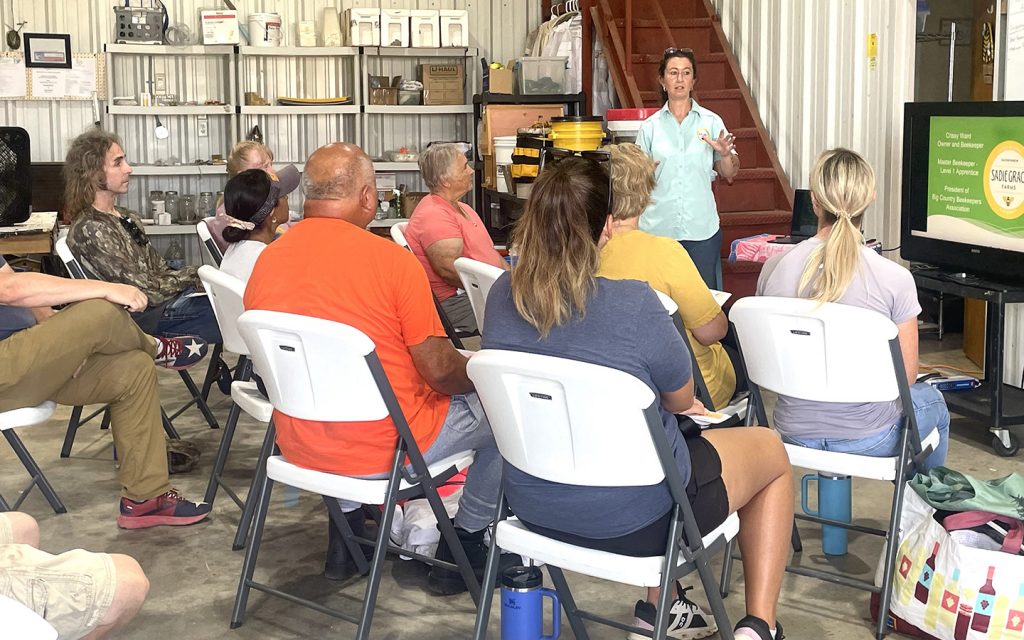 Through her passion for her pursuit and her continued training, Crissy hopes to expand ways to share the wonder of bees with her community.
Through her passion for her pursuit and her continued training, Crissy hopes to expand ways to share the wonder of bees with her community.
Sadie Grace Farms offers beekeeping classes throughout the year, as well as private tours. Crissy said plans are underway for the April 5th grand opening of their screened-in Bee Barn, where visitors can learn about all things honeybee, with up-close views into the hive and detailed descriptions of how beekeepers work.
Crissy said the bee population is on the rise, and it is through education that their mission of protecting them will continue.
“The beekeeping community is tight knit because we have the same mission, which is to grow our apiaries so the bee population can continue to rise,” she said. “We want these little instruments of God’s creation to continue to thrive.”
For more information on Sadie Grace Farms, including events, education, removal or to purchase merchandise, visit www.sadiegracefarms.com.
By Molly Hill
Photos By Shayli Anne Photography
RELATED: Made at Home




























Leave a Reply